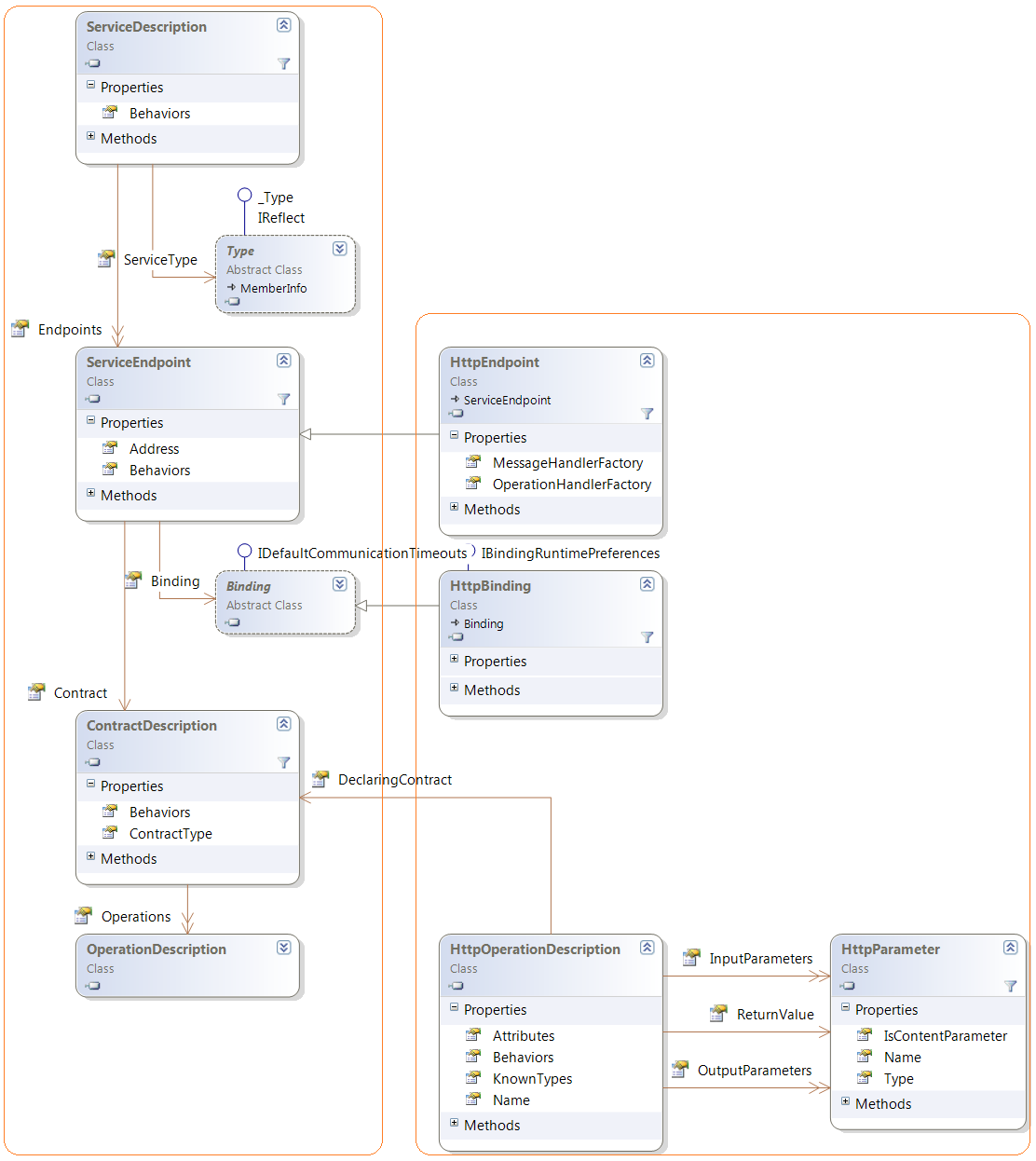An introduction to WCF Web API
Pedro Félix, ISEL Tech 2011
Introduction
- Extension to the Windows Communication Foundation
- Announced at the 2010 PDC
- Work in progress - currently in Preview 4
- No final release date yet
- Community participation
- Feedback
- However, no source code contribution
Goals
- Development of web APIs, characterized by
- Usage of HTTP as the application protocol (no SOAP)
- Usage of multiple media types
- Usage of multiple formats (e.g. XML, JSON)
- Multiple architectural styles (e.g. RPC and ReST)
- Consumption by multiple client devices
- Base for ReST style system
- Not "opinionated"
- No resource model yet
Goals
- Testability
- E.g. No need for
WebOperationContext.Current - E.g. Public constructors
- E.g. No need for
- Composability
- IOC/DI friendly
- IOC/DI friendly
- Simpler configuration model
- Code based
Availability
- Source available at wcf.codeplex.com
hg clone https://hg01.codeplex.com/wcf
- Nuget package
Install-Package WebApi.All
Programming Model
- Original WCF programming model
- Based on the SOAP and WSDL models
- Transport independence
- HTTP is a transport detail
- Web API programming model
- Based on the HTTP model
- HTTP used as the application level protocol
- Adds on the WCF original model
- Based on the HTTP model
The Service Class
1 [ServiceContract] 2 class TheService 3 { 4 [WebGet(UriTemplate = "time")] 5 HttpResponseMessage TheOperation(HttpRequestMessage req) 6 { 7 return new HttpResponseMessage() 8 { 9 StatusCode = HttpStatusCode.OK, 10 Content = new StringContent( 11 DateTime.Now.ToLongTimeString()) 12 }; 13 } 14 }
Programming Model
ServiceContractis just a container for operations- Operations are instance methods annotated with
WebGet[UriTemplate="..."], orWebInvoke[UriTemplate="...", Method="..."]
- Operations handle HTTP requests selected by
- The HTTP method (e.g. GET, POST)
- The match between the Request URI and the URI template
- Contract is a legacy term
HTTP messages
- Strongly typed request and response messages
- With public constructors

Operation Parameters
HttpRequestMessageHttpRequestMessage<T>- URI template match bound variables
- E.g.
UriTemplate = "time/{zone}"
- E.g.
- Query string pairs
- A content model
- Parameters injected by operation handlers
Operation return
HttpResponseMessageHttpRespondeMessage<T>- A content model
The Service Host
1 class Program 2 { 3 static void Main(string[] args) 4 { 5 using (var host = new HttpServiceHost(typeof(TheService), 6 "http://localhost:8080")) 7 { 8 host.Open(); 9 Console.WriteLine("Host opened at {0} , press any key to end", 10 host.Description.Endpoints[0].Address); 11 Console.ReadKey(); 12 } 13 } 14 }
Hosting
- Similar to the original WCF model
- service hosts and factories
- Self-hosting
- New
HttpServiceHost - New
HttpBinding
- New
- IIS hosting
RouteCollectionextension methods
IIS Hosting
1 public class Global : System.Web.HttpApplication 2 { 3 protected void Application_Start(object sender, EventArgs e) 4 { 5 RouteTable.Routes.MapServiceRoute<TheService>("base_path"); 6 } 7 }
Runtime Architecture

Runtime Architecture
- Message Handlers
- Receive a
HttpRequestMessage - Must produce a
HttpResponseMessageasynchronosly - Contains a reference to an inner channel
- Endpoint scoped
- Receive a
- Operation Handlers
- Receive
HttpParametersets - Produce
HttpParametersets - Operation scoped
- Receive
Message Handlers


Demo: message handler
Operation Handlers
- Operation Handlers
- Use parameters from a bag
- Contribute with parameters to the same bag
- Initially this bag contains
- The
HttpRequestMessage - The matched
URITemplatebound variables
- The
- The final bag contents are usable by the operation

Demo: operation handler
Formatters
- Operations can receive
HttpRequestMessage<T>or a content model - Operations can return
`HttpRequestMessage<T>or a content model MediaTypeFormatter- conversion between the HTTP body and the content model- Supports server-driven content negotiation
Demo: media type formatters
Configuration
- In prototyping phase
HttpHostConfigurationconfiguration builder- Fluent interface
HttpConfigurableServiceHostservice hostRouteCollectionextension methods receiving the configuration
Configuration
1 var cfg = HttpHostConfiguration.Create() 2 .AddMessageHandlers(typeof (SampleMessageHandler)) 3 .SetOperationHandlerFactory(new MyOperationConfigurationFactory()); 4 5 var host = new HttpConfigurableServiceHost(..., cfg, ...){ 6 7 class MyOperationConfigurationFactory : HttpOperationHandlerFactory{ 8 override Collection<HttpOperationHandler> 9 OnCreateRequestHandlers( 10 ServiceEndpoint endpoint, 11 HttpOperationDescription operation){ 12 var coll = base.OnCreateRequestHandlers(endpoint, operation); 13 coll.Add(new LoggingOperationHandler(operation)); 14 if (operation.Name == "GetTimeString") 15 { 16 Formatters.Remove(Formatters.XmlFormatter); 17 Formatters.Remove(Formatters.JsonFormatter); 18 Formatters.Add(new WaveFromTextFormatter()); 19 Formatters.Add(new ImageFromTextFormatter()); 20 } 21 return coll; 22 } 23 }
Description

Resources
- http://wcf.codeplex.com/, namely the source and the discussions
- Glenn Block's blog and videos
- My WCF Web API post series